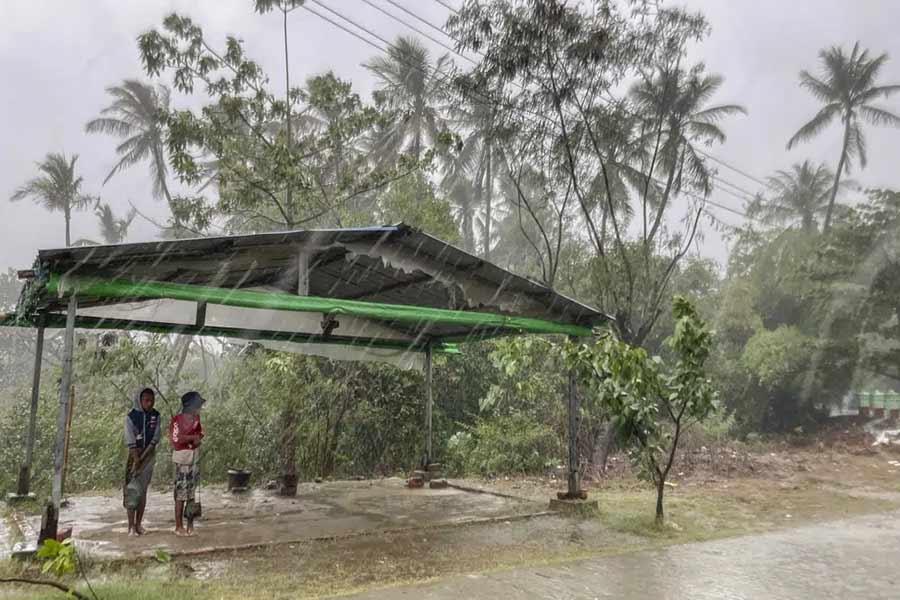
Published :
Updated :

The aftermath of every natural calamity, be it cyclone or earthquake, offers a common spectacle: the suffering children. The scenes of orphaned children after the recent earthquakes in Turkey are fresh in the memory of many. The latest of these spectacles comprise the hapless child victims of Cyclone Mocha in Bangladesh and Myanmar. After panicking people for a week, the cyclone has spared Bangladesh, and made its full-scale landfall on the southern Myanmar. Although seemingly a brush with Bangladesh, the cyclone has let loose a phase of ordeals on the hapless families along the country's coastline. A similar scenario has been enacted in southern Myanmar on the coast of Bay of Bengal. That in both the countries, millions of vulnerable children and their families are now passing their days in all kinds of miseries can be understood. In short, these people, especially the Rohingya children, have to deal with worse times in the coming days. A difference can be made only with a proactive bail-out of these silent victims of the 14 May cyclone.
As UNICEF has assessed the situation, the trail of destruction left by Cyclone Mocha not only affects those already living in dire conditions, but also poses a severe threat to the wellbeing of numerous other communities. The experience of the storm will soon lodge in the past like all other natural calamities. But for the Bangladesh coastline people the looming apprehension of waterborne diseases is feared to escalate in the coming days, the UN agency observes. Given the harried state of the two already benighted communities, the worsening of their plight turns out to be a foregone conclusion. In fact, the Rohingya communities in both Bangladesh and Myanmar have been badly affected by Mocha. Being nearly encircled and hounded by Myanmar regime and its cohorts, the Rohingyas in their own country have long been going through different types of persecution. As a general scenario shows, more than 16 million people, 5.6 million of them children, including 1.2 million internally displaced people --- Rohingya, ethnic Rakhine and other communities, were in the path of the cyclone in the Rakhine state. The extent of damage caused by the fury of Mocha, can, thus, be presumed.
In Bangladesh, the impact of the swoop of the cyclone on the Rohingya camps didn't take much time to become clear. The storm left the country soon on its way to Myanmar. But during its brief presence in Bangladesh, it played a near-havoc with the displaced Rohingyas in their makeshift shelters. Child victims in countries torn by civil wars, ethnic conflicts and other scenes of unrest have long been common scenarios. Regions hit by natural calamities also render them silent victims. Earthquakes, floods and cyclones dominate the natural calamity scenarios. At these spots, it is the tender-aged children and teenage boys and girls who fall victim to the syndicates involved in child trafficking. These traffickers target mostly the children separated from their parents due to the impact of natural disasters.
The conflict zones in the Sub-Saharan countries plagued by protracted civil wars offer scenes of innocent children being sucked in by armed imbroglios. Although the distressing scenes have subsided for some time in these countries, ethnic tensions and the following savageries often flare up there intermittently. The northeastern African country of Sudan has lately been bogged down in an armed conflict between the country's military and the paramilitary forces. The country has long descended into an uncontrollable armed chaos. The civilians are trying desperately to flee the conflict zones. The panic-stricken and bewildered children comprise a considerably large segment of people fleeing the conflict zones.
At present, a dozen of spots around the world are passing through large and small conflicts. The dominant of them is the Russia-Ukraine war. The others include civil wars in Central African Republic, Ethiopia, Libya, Mali and Somalia. Apart from territorial aggression, these conflicts also include terrorist insurgencies. In South America, the scourge of drug war has destabilised a large swathe of the continent for decades. Innocent people, including children, are being used in these conflicts. Perhaps the fiercest of these confrontations, the one that occupies the most dominant place, is which involves Russia and Ukraine. On February 24, 2022, Russia invaded and occupied parts of Ukraine in a major escalation of the Russo-Ukrainian War, which had actually begun in 2014. The invasion has resulted in tens of thousands of deaths on both sides, and instigated Europe's largest refugee crisis since World War-II. Children, many orphaned and separated from their parents, have comprised a large part of the war victims.
The deadly cyclones, earthquakes and wars and conflicts that assault the poorer countries create favourable grounds for trafficking gangs to engage in their abominable trade. During the Europe-bound mass-scale migration from the conflict-ridden Middle Eastern and North African countries a decade ago, lots of children have allegedly been lifted, or died in the perilous journey on makeshift boats. Children are not safe even during the time of peace. Situations beyond their control intermittently force the helpless children to cope with adverse situations with none beside them. These adversities include mostly natural disasters like cyclones, floods, tsunamis and droughts. Despite their forecasts days in advance, many would like to include volcanic eruptions in the list of calamities that affect children. A sad part of these life-threatening hazards: lots of children get separated from their parents never to reunite.
shihabskr@ymail.com


 For all latest news, follow The Financial Express Google News channel.
For all latest news, follow The Financial Express Google News channel.